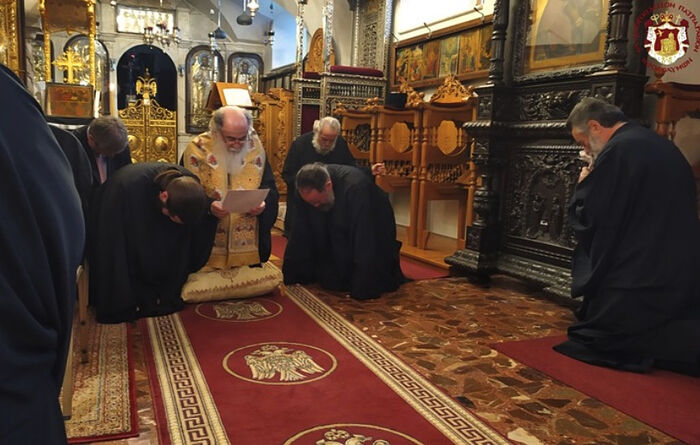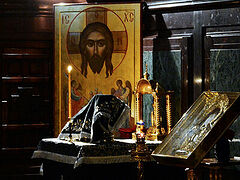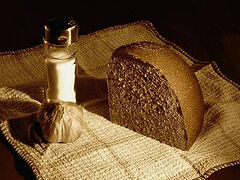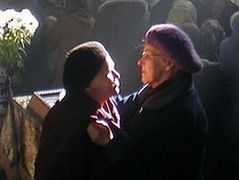February 27, 2023
 Photo: Jerusalem-patriarchate.info
Photo: Jerusalem-patriarchate.info
Every year, the holy Orthodox Church calls on us to enter into Great Lent with the humble act of entreating forgiveness from all and offering forgiveness to all.
In their pastoral letters and homilies on Forgiveness Sunday, the primates of the Local Orthodox Churches emphasized the power and necessity of forgiveness:
Patriarch Kirill of Moscow and All Russia:
We begin the field of Lent with this evening, when we ask each other for forgiveness. This is the first, small, but very important step. However, for someone this step is very difficult, especially when problems, resentments really divide people, and everyone is indignant at the one he fought with, believing it’s the other who is certainly to blame for everything. After all, most often we justify ourselves and put all the blame on the other, on the one we fought with, who we hold some kind of grudge against. Today demands from us that we not impose responsibility on anyone else—only on ourselves. That’s why it’s required of us to take a difficult first step—to ask for forgiveness from those we’re fighting with, whom we’ve offended. It’s incredibly difficult to approach a person with full consciousness of our personal guilt and ask him for forgiveness, but the Church of God demands this from us. It requires that we enter the field of Great Lent already having some experience of self-criticism, humility, and forgiveness.
Today’s Divine service calls us to gain this experience through humbly petitioning our neighbors for forgiveness of our sins, for forgiveness of what we have done before them explicitly or implicitly, in deeds or thoughts. And therefore, we shouldn’t assume that what is happening tonight is a kind of custom that requires us to formally say “Forgive me!” and an even more formally answer “God forgives!” These words should contain our repentance and awareness of our real guilt. That’s when Forgiveness Sunday really becomes the door to the field of the Great and saving Lent.
Today is the day of forgiveness. Therefore, I turn to you now with a request:
Throw off your sins, and receive blessings and forgiveness from the Heavenly Father.
May God have mercy on you and forgive you all your sins, voluntary and involuntary, in the name of the Father and the Son and the Holy Spirit, Amen!
Patriarch Porfirije of Serbia:
In today’s Gospel … the Lord Himself … warns that forgiveness is what opens the way to God, that forgiveness is the space and place where the grace of God resides, that this is the way by which the Lord comes to us. After all, it’s only an explanation and an extension of the Lord’s Prayer, the Our Father, where the Lord teaches that we should pray saying: Forgive us our debts as we forgive our debtors, and then He addresses us even more directly: If you do not forgive other people’s debts and sin, then God won’t forgive you.
… That’s why He says to forgive others, to forgive our neighbors, to forgive people, not so that they might forgive us, but because it’s necessary so that we can understand the word of God and open ourselves to the grace of God.
… When we have a thought against someone, even if that thought is justified, that thought—which won’t allow us to forgive—makes us slaves…. Because of the inability to forgive, there is no peace and no joy in our soul. This means that God will forgive us the moment we forgive. We then free and unblock those obstacles in our soul that prevent the grace of God and His presence from manifesting.
By forgiving our fellow man, a crucifixion of one’s own selfishness is carried out and at the same time the beginning of a merciful love is shown. Man is forgiven by God especially if he himself also forgave.
… God asks that when we want to draw nearer to Him, we not forget our fellow men, and if we ask for forgiveness of sins, we also forgive our neighbors.
Forgiveness of one’s neighbor is also a condition for communing of the Body and Blood of the Savior, therefore “for the beginning of the Fast, but also for more frequently communing, this forgiveness of our fellow men is necessary.”
When we forgive, we free ourselves from the burden of what has accumulated in the soul and which hinders our natural striving towards God and the heights. When we know we’re forgiven, we feel ease, peace of mind, and unearthly joy. Mutual forgiveness gives us incredible powers with which to rise above the earthly and the vain, to continue forward and upward in our pursuit of the bright and the higher. Such are the true fruits of forgiveness, which the holy Church calls us to seek and to give all the days of our lives, but especially today, when the feat of Great Lent is before us.
Let us truly take advantage of the opportunity given to us, to cleanse each other of the burden of anger, of every voluntary and involuntary transgression, and transformed by the washing of penitential tears, to enter the blessed time of repentance, when we shall walk together with the Savior Christ all His thorny path to Calvary and the Cross, death, and the grave, so that we might greet each other with pure hearts and His all-victorious Resurrection.
Fathers, Brothers, Sisters, Youth, Children! According to our custom, entering the Holy Forty Days, we ask each other for forgiveness of our transgressions. The Apostle Paul exhorts Christians: Let not the sun go down upon your wrath (Eph. 4:26), Be not overcome of evil, but overcome evil with good (Rom. 12:21). Lord, help us in this work!
Metropolitan Onuphry of Kiev and All Ukraine:
The Lord is ready to forgive us all, but the man who can’t forgive his neighbor can’t contain God’s forgiveness. The human soul is arranged in such a way that if I don’t want to forgive another, then they can forgive me, but I don’t accept this grace, I reject it from myself. And so that we’re not condemned for receiving the grace of forgiveness and not accepting it, God doesn’t forgive a man if he doesn’t forgive his neighbor. The Holy Scriptures say that if you have something against your adversary, try to make peace with him on the way, so that he doesn’t hand you over to the judge.
… We must make peace with our brothers and focus all our efforts on defeating the devil.
… We become like God when we love our neighbor as God loves each of us. Therefore, by forgiving one’s neighbor, a man thereby becomes like God, who forgives us, and fills his soul with Divine power, grace that helps a man live decently on earth and be saved in Heaven... Such a man begins to feel bliss—he’s happy, joyful, he feels good. Otherwise, a man is constantly in sorrow, because the soul wants to be like God and it suffers.
Follow OrthoChristian on Twitter, Vkontakte, Telegram, WhatsApp, MeWe, and Gab!




